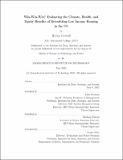Win-Win-Win? Evaluating the Climate, Health, and Equity Benefits of Retrofitting Low Income Housing in the US
Author(s)
Caswell, Helena
DownloadThesis PDF (3.369Mb)
Advisor
Sterman, John
Patten, Bethany
Terms of use
Metadata
Show full item recordAbstract
Large scale energy efficiency and electrification of the US residential sector are needed to meet the Paris Agreement goal of limiting warming below two degrees Celsius. Energy efficiency retrofits can also provide significant health and economic benefits, especially for low-income residents. These non-energy benefits are often excluded from policy analysis of energy efficiency programs because they are not well quantified, especially at a local level. In this thesis I quantify a subset of these public and private health benefits and develop a cost benefit analysis at the county level across the continental US of a retrofit policy for low-income households that includes electrification and efficiency measures. The retrofit policy yields a positive average net present value in 29\% of counties when considering only the private benefits of reduced energy consumption. However, retrofits yield positive net present value in all US counties when public and private health benefits are included. I also explored the potential impacts of a retrofit policy on household energy burden (household energy expenditures divided by household income). In most counties, retrofits would more than offset the additional cost of energy from a \$51 per metric ton carbon price, the current social cost of carbon estimated by the federal government. The gap between public and private retrofit benefits prevents low-income households from implementing energy efficiency measures. Programs to subsidize low-income retrofits would reduce economic deadweight loss, climate emissions, and energy costs, while improving human health and wellbeing for low-income households that currently suffer disproportionately from inefficient housing.
Date issued
2022-05Department
Massachusetts Institute of Technology. Institute for Data, Systems, and SocietyPublisher
Massachusetts Institute of Technology